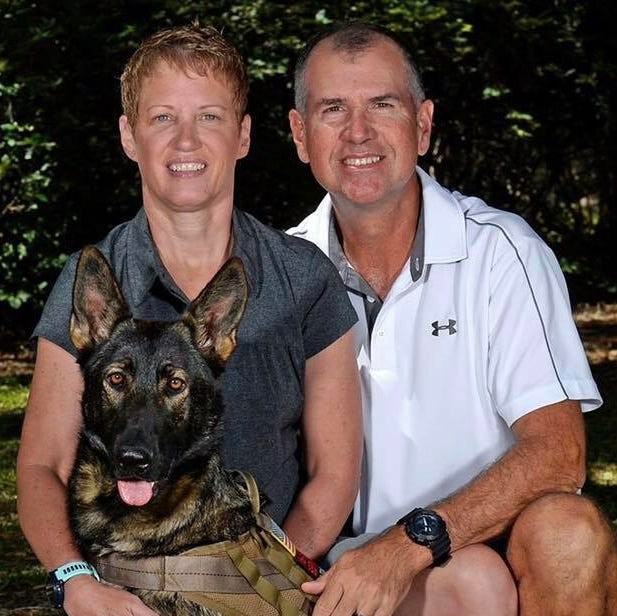On several occasions, people have called out Army veteran Natalie Vines, who has a TBI and PSTD, when parking in a handicapped parking space. They see the disabled veteran plate, but tell her she should not be parking there without her disabled veteran husband, never once thinking she might be the veteran. "I don't need recognition for my service, I am proud of it, but being overlooked because I am female still stings," she says. "We did the same things the guys did in combat."
Shortly after Brian and Natalie Vines met in the military in 1998, their unit deployed to Kuwait. Fueled by assignments on nearby bases, common interests, and shared military experiences, their friendship grew into a romantic relationship that eventually led them to the alter. Brian and Natalie loved their careers in the U.S. Army — Brian served for 28 years and Natalie for 21.
After several sustaining several TBIs and living with PTSD, Natalie retired from the Army. And in 2012, Brian, who lives with PTSD as well, decided to retire to take care of his wife. Since then, both Brian and Natalie also found significant growth and healing through their participation in the WWP Independence Program. Brian volunteers as a peer mentor helping his fellow veterans on WWP Project Odyssey® events.
For information about treatments for TBI and PTSD, please visit The Treatment Hub.
They see a veteran, but they don't see what is maybe behind the veteran. And maybe a little more patience sometimes with the veterans because sometimes they don't know where all these veterans have come from. One of the themes that particularly female veterans have to experience is the thought that all veterans are males.
So, Natalie has had situations, we have a disabled veteran license plate, that someone would call her out and say, “your husband’s not in the car; you shouldn’t be parking in the veteran’s parking space.” Things like that, that they just assume that I’m the disabled veteran. It’s kind of a slap, not in her face, but in my face. I think sometimes they just don't see that women serve too.
And what they see is a male getting out, he served. So, I don't get a lot of recognition at all and it’s usually him, which is okay. I mean, I served and I’m proud of that and I don't need the recognition. It’s not about that. It’s about what I feel and what I think I did and what – and the honor I feel that I did. So it’s not about that. But when they do say something, I feel that. I feel that that missing - like, “hey, I served too and I didn’t just serve in the small piece, sitting in the background. I did deploy, I did see action, I did see combat.” And sometimes people don't see that, that we can do the same thing that the guys can do.
BrainLine is powered in part by Wounded Warrior Project to honor and empower post-9/11 injured service members, veterans, and their families.
About the author: Brian and Natalie Vines
Shortly after Brian and Natalie Vines met in the military in 1998, their unit deployed to Kuwait. Fueled by assignments on nearby bases, common interests, and shared military experiences, their friendship grew into a romantic relationship that eventually led them to the alter. Brian and Natalie loved their careers in the U.S. Army — Brian served for 28 years and Natalie for 21. After several sustaining several TBIs and living with PTSD, Natalie retired from the Army. And in 2012, Brian, who lives with PTSD as well, decided to retire to take care of his wife. Since then, both Brian and Natalie also found significant growth and healing through their participation in the Wounded Warrior Project® Independence Program. Brian volunteers as a peer mentor helping his fellow veterans on WWP Project Odyssey® events.

